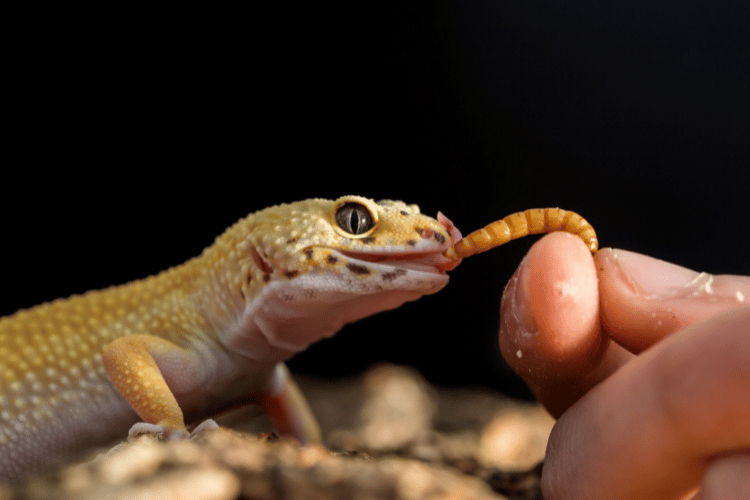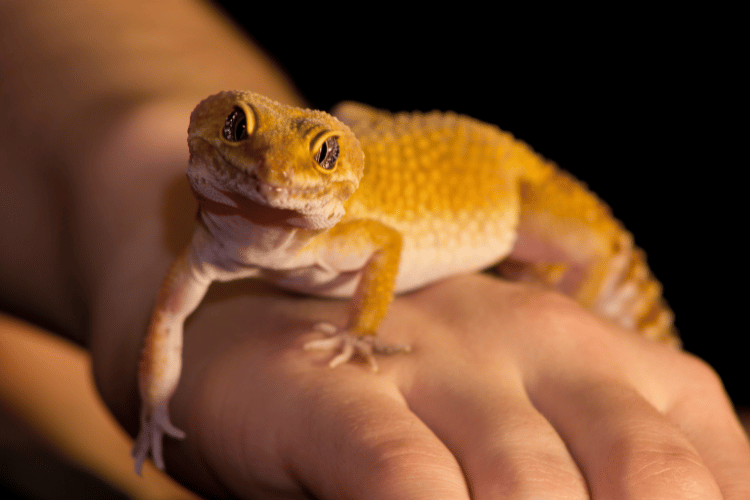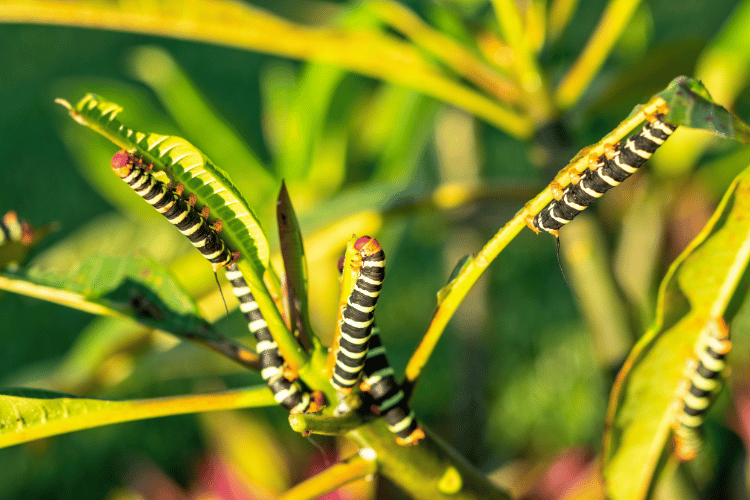Leopard geckos are insect lovers. These unique pets typically enjoy munching on caterpillars and worms, effectively growing as you provide enough insects and allow them to hunt.
But does this mean that you can give any type of worm to your leopard gecko?
Opinions vary when it comes to different species of worms, so you need to do your homework regarding diet compatibility before feeding your pet leopard gecko any insect.
So, can leopard geckos eat hornworms?
Today’s guide offers an in-depth answer that explains how hornworms can be part of a leopard gecko’s diet, the pros and cons of giving hornworms to leopard geckos, the effect of hornworms on your pet gecko’s health, and much more!

What Are Hornworms?
Hornworms are light green/blue and brown caterpillars representing the larval stage of a moth species known as the hawk or sphinx moth.
Compared to other caterpillars, hornworms are pretty big. They can grow up to 4 or even 6 inches long.
Hornworms get their name from the horn-like structures that you can see extending from their bodies, particularly at the end of the last (8th) segment of the abdomen.
Hornworms are readily present across the United States and southern areas of Canada. You can find them on leaves and sweet fruits of plants such as tomatoes, eggplants, and tobacco.
Are Hornworms Available in Stores?
Yes, you can come across hornworms in just about any pet store that offers live food. They’re usually available in small cups or containers and are somewhat pricier than other types of insects.
If your local pet shop doesn’t carry hornworms, you can probably order some online and have them shipped to your address.
If you’re thinking about breeding hornworms on your own, you should keep in mind that the process requires a lot of patience.
Successful breeding needs plenty of time and effort, as well as special equipment to accommodate the caterpillars at different life stages.
Can Leopard Geckos Feed on Hornworms?
Hornworm caterpillars make for perfectly acceptable and highly nutritious food for leopard geckos.
You can give your pet gecko hornworms as a treat or use them as a primary food source if your reptile is picky about its diet.
However, in the latter case, you’ll have to pair the larvae with supplements to ensure your leopard gecko receives all the nutrients necessary for healthy growth.
You may think that eating these caterpillars is unfavorable because of the spikes/horns that stick out of a hornworm’s body, but you don’t need to worry about the ability of a leopard gecko to handle those outgrowths.
You see, the horns coming out of hornworms’ bodies are soft and free of toxins. As such, your pet gecko should have no problem swallowing the oversized caterpillars.
That said, leopard geckos can easily develop a preference for hornworms as most of the reptiles do enjoy them and like eating those caterpillars whenever there’s a chance.
In some cases, eating hornworm species will turn addictive to leopard geckos, which will then refuse other types of food.
As such, feeding hornworms to your pet leopard gecko should follow a proper frequency and amount depending on the reptile’s age. We’ll talk about establishing a balanced diet in later sections.
Are Hornworms Part of Leopard Geckos’ Diet in the Wild?
When it comes to keeping any pet healthy and encouraging strong growth, the rule of thumb is to put them on a diet that mimics their food in their natural habitat as closely as possible.
So, do leopard geckos munch on hornworms in the wild?
Well, considering that hornworms exist pretty much everywhere across the country and the fact that leopard geckos are exclusively on an insect diet, it’s safe to say that leopard geckos eat hornworms in the wild.
Not to mention, the taste of hornworms is appealing to leos, which increases the likelihood of the reptiles including the caterpillars in their natural diet.

Are Hornworms Suitable Food for Baby Leopard Geckos?
The dietary requirements of juvenile leopard geckos are quite different from those of adult leopard geckos despite both eating only insects.
Baby leopard geckos need to feed more frequently and the insects they eat have to be smaller so they can digest them. For reference, juvenile geckos should eat at least 3 times per day.
Additionally, baby geckos require higher calcium content from their diet, so be sure to provide them with enough calcium from food.
So how do hornworm species fit into juvenile leopard gecko food plan?
Well, baby leopard geckos can eat hornworms as long as the caterpillars are young. This will ensure that the hornworms will be small and soft enough for the baby geckos to swallow and digest.
Fully-grown hornworms are too large and thick for young leopard geckos to consume.
If you have hornworms that you plan on feeding to baby leopard geckos, chances are you’ll want to slow down the growth of the insects to ensure they remain a suitable size for the baby geckos.
You can do so by keeping your hornworm species in cold and dark environments, ideally between 50 and 60 degrees Fahrenheit.
Can I Give Hornworm Pupa to My Leopard Gecko?
Hornworms develop from eggs to larvae to pupae to moths throughout their life cycle. When feeding hornworms to leopard geckos, we’re typically talking about the larval stage, but what about the pupa stage?
It’s okay to give hornworm pupa to your adult leopard gecko as long as the insects haven’t grown too large and hard yet.
Don’t try offering hornworm pupa to your baby gecko as it’s highly likely to cause suffocation.
Why Let Your Leopard Gecko Eat Hornworms?
A great nutrition source for leopard geckos, hornworm species contain various elements that your lizard needs to grow and thrive.
Hornworms are an excellent source of calcium yet a relatively poor source of protein and vitamins. They’re also low in fat levels and offer high moisture content.
That said, let’s take a look at the nutritional value of hornworms:
- Calcium: 464 mg per a 100gm hornworm
- Protein: 9%
- Fat: 3%
- Moisture: 85%
Now, let’s discuss the benefits of giving hornworms to your leopard gecko:
- The green/blue color of the hornworm species is bright enough to catch the attention of leopard geckos, making the insect more appealing.
- Hornworms come in various sizes and can grow rather fast. This helps you find suitable sizes for leos of varying ages.
- Your leopard gecko will have no issues catching hornworms because they’re slow movers.
- Digesting hornworms should be easy for your leopard gecko as the insects are virtually free of chitin.
- Hornworms are a fantastic source of moisture, which helps keep your gecko hydrated.
- Hornworms are rich in calcium compared to many other worms such as silkworms, mealworms, and butter worms.
- Since hornworms are low in fat content, they’re less likely to contribute to your gecko putting on weight, especially with this type of lizard being prone to weight gain.
What Are the Downsides of Leopard Geckos Eating Hornworms?

Now that you’re familiar with the pros of hornworms in a lizard’s diet, here are the disadvantages of feeding these insects to leopard geckos:
- When you feed them too often, the taste of hornworms can cause your leopard gecko to develop a preference/addiction when.
- Compared to mealworms, butter worms, super worms, and crickets, hornworms don’t offer an adequate amount of protein.
- Hornworms grow quickly, so you may miss your window to feed them to baby geckos while still small.
- Hornworms are on the expensive side, so stocking up on them may not be affordable.
- You can’t store hornworms for more than 2 months because of their short lifespan.
Is It Safe for Leopard Geckos to Eat Hornworms?
Hornworms are generally safe for your leopard geckos to eat.
Although the caterpillars and their horns are non-toxic, they could infect your lizard with a bacteria or parasite that’s potentially lethal.
While you may not have the expertise to figure out the toxicity of hornworms, a good practice is to feed your pet leopard gecko store-bought hornworms only from a reputable supplier.
Don’t give your gecko any hornworms that you’ve collected from the wild. These insects could’ve eaten solanine leaves or chemically-treated crops, so they may end up transferring toxins to your pet.
How Often Should I Feed Hornworms to My Leopard Gecko?
To avoid developing preference or addiction, don’t give hornworms to your leopard geckos too frequently. Once per week or every other week is good enough.
How Many Hornworms Should My Leopard Gecko Eat?
This depends on the age of your leopard gecko. Per feeding, you can give baby geckos about 2 to 4 hornworms, juveniles up to 8 worms, and adult geckos between 4 and 6 worms.
Wrapping Up
So, can leopard geckos eat hornworms? The answer is yes but in moderation.
A varied diet for geckos is the way to go if you want your leopard gecko to grow healthy.
While hornworms contain high moisture levels, are a great source of calcium, and have a low-fat content, they don’t provide nearly enough protein on their own and are a poor source of vitamins.
Feeding your leopard gecko a hornworm-only diet will lead to a serious lack of nutrients, causing your leopard gecko to act destructively due to hunger and stress.
- Can Leopard Geckos Eat Silkworms? - March 11, 2024
- Do Leopard Geckos Climb? - March 4, 2024
- Do Leopard Geckos Bask? The Answer Will Surprise You - February 21, 2024
